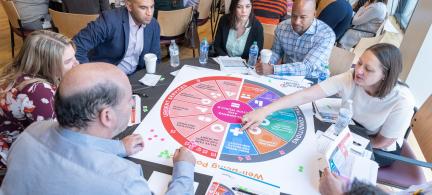
Thriving Communities Workshop: Bridging Social Needs and Vital Conditions
As a follow-up to a Pool Speaker Series lecture held in April, Leonard Parker Pool Institute for Health hosted a workshop on June 8 titled “Thriving Communities Workshop: Bridging Social Needs and Vital Conditions.” The workshop was led by Bobby Milstein and his colleagues from ReThink Health at The Rippel Foundation and included a group of nonprofit community leaders and health care professionals. The focus was on a vital conditions framework and evaluating the way we invest resources to create a thriving community.
The Rippel Foundation began with the premise that a future where every person has the opportunity to thrive cannot be achieved with a series of narrow projects or technical fixes, and that holding a vision that centers the community as the focus requires us to think and act differently. The workshop highlighted the idea that our well-being currently relies on systems that are not built for everyone to thrive. However, our social systems can be transformed if individuals and organizations in every sector see ourselves as interdependent stewards to creating a better future.
During the workshop, Dr. Milstein referenced a 2022 Gallup Poll that displayed the percent of United States adults who report they were thriving from 2008-2022. Not surprisingly, there were two low points during that time, one during the 2008 recession and another during COVID-19. However, even at this graph’s peak in June 2021, only 59.1% of U.S. adults felt they were thriving. The question was posed – what will it take to reach even greater heights of well-being, equity and resilience?
Another topic during the workshop was the evolving roles of hospitals in a wider movement for equitable health and well-being. This is organized around vital conditions to move the social determinants agenda into a wider action, and shift from the business-as-usual approach to new ways of working as shared stewards of an equitable, thriving future in Allentown and across the Lehigh Valley.
The room then engaged in two thought-provoking group activities. Several groups of 8-to-10 individuals were handed a large poster displaying a “Well-Being Portfolio” wheel. The wheel consisted of 12 different slices and a middle filling. Six slices on the right side of the wheel listed urgent services, or services that anyone under adversity may need temporarily to regain or restore well-being – acute care for illness or injury, addiction treatment, crime response, environmental cleanup, homeless service, and unemployment and food assistance.
Six more slices on the wheel’s left side and the center circle were individual vital conditions, or things that all people need regularly to be healthy and reach their full potential - thriving natural world, basic needs for health and safety, humane housing, meaningful work and wealth, lifelong learning, reliable transportation, and belonging and civic muscle.
Each aspect of the Well-Being Portfolio is distinct and indispensable. “Together, they form an independent system that shapes the chances for people and places to thrive,” said Dr. Milstein.
All groups were then provided 20 red dot stickers and 20 green. Thinking like a resident in Allentown, each group had to divide, allocate and disburse the 20 red stickers on the wheel to slices that they believed we currently invest the most resources. After 10 minutes of discussion, groups then had to allocate their 20 green dots toward the places they would like to see future allocations on the same wheel.
When recording the average of all group responses, the results showed a collective desire to increase resources in six of the seven vital condition areas, while scaling back five of six urgent services.
The activity paved the way for a second activity working with a “Three Horizons for the Future” framework. This framework visualizes the current trajectory where fragmentation (the practices we can let go of that no longer work) is the norm and then a future trajectory where interdependence (the goals we work toward) is the norm. Groups also explored the trajectory in between that will take us from the current state to a future where we are able to support interdependence and therefore create conditions for thriving.
Groups talked about what it let go of and what to work toward while acknowledging fragmentation, shared stewardship and interdependence. They discussed where there are current examples of fragmentation, such as the war on drugs and below-poverty jobs, as well as pockets of innovation that move toward interdependence. The groups closed with a discussion of what we can each do as stewards to move toward a future of thriving where we recognize and support interdependence among the systems and community members within Allentown.
The Leonard Parker Pool Institute for Health expresses its sincere gratitude to ReThink Health at The Rippel Foundation and its team on another insightful visit to Allentown. We look forward to continuing our strong partnership with the Rippel Foundation and facilitating ongoing dialogue with our community leaders. We encourage others to take these tools and activities and have this same conversation with their team or collaborative. Where would you want resources to be invested? What should we let go of today to create space for new investments and collaborations? Please reach out if you want to know more or want to host a similar workshop in other spaces.
